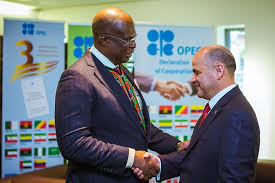There are no products in your shopping cart.
| 0 Items | £0.00 |


NIGERIA has received a big economic boost as a result of the ongoing war between Russia and Ukraine as the price of crude oil has surged towards $120 a barrel after the Organisation of Petroleum Exporting Countries (Opec) decided against a big production increase.
Over the last week, Russia and Ukraine have been involved in a conflict that many fear could lead to a major global war. At the heart of the conflict is Ukraine's recent decision to join the Western military alliance the North Atlantic Treaty Organisation (Nato), which Russia opposes, saying the move threatens its security.
Russia is the world's third largest crude oil producer with a daily output of 11.2m barrels but with the start of the conflict, many Western nations have imposed economic sanctions against Moscow. With this cancellation of Russian orders, oil prices have been on the rise but at a meeting yesterday, Opec ministers decided against any significant rise in production which could force prices down.
Yesterday for instance, the price of Brent Crude surged to $111 a barrel after Opec's oil ministers agreed to stick to production quotas agreed in 2020. At the end of their 26th Opec and non-Opec ministerial virtual meeting yesterday, the oil producers issued a statement making it clear that there will be no production increases to make up for Russian shortages on the market.
Their statement read: “Following the conclusion of the 26th Opec and non-Opec ministerial meeting, held via videoconference on March 2, 2022 and based on internal consultation held exclusively by the Opec and participating non-Opec oil-producing countries in the declaration of cooperation, it was noted that current oil market fundamentals and the consensus on its outlook pointed to a well-balanced market and that current volatility is not caused by changes in market fundamentals but by current geo-political developments. Opec and participating non-Opec oil-producing countries decided to reaffirm the decision of the 10th ministerial meeting on April 10, 2020 and further endorsed in subsequent meetings including the 19th ministerial meeting on July 18, 2021.
"We reconfirm the production adjustment plan and the monthly production adjustment mechanism approved at the 19th ministerial meeting and the decision to adjust upward the monthly overall production by 400,000 barrels a day for the month of April 2022, as per the attached schedule. Also, we reiterate the critical importance of adhering to full conformity and to the compensation mechanism taking advantage of the extension of the compensation period until the end of June 2022.
"Compensation plans should be submitted in accordance with the statement of the 15th ministerial meeting. We will hold the 27th Opec and non-Opec ministerial meeting on March 31, 2022.”
There are fears the situation might get worse as there are addition dangers for oil tankers travelling in the Black. Also, the cut in Russian oil and natural gas supplies to markets will have spill over effects and further increase the prices of coal and liquefied natural gas.